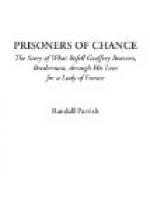It was a fearful spot to be in. That dark interior, dimly lighted by fitful bursts of flame, seemed more the abode of the damned than a place of human habitation, nor was there anything to remind us of mercy in that savage company gloating over our desperate plight. No one of us doubted what fate dwelt in the decision of that grewsome gathering, and in those faces we saw nothing except eagerness for revenge. It was their speechless silence, their stolid imperturbability, which rested heaviest upon me. It told plainly that we were helpless victims of their cruel pleasure. Deliberately, as if desirous of prolonging the agony of our uncertainty, for more than an hour—to us it seemed an age—they sat thus, unmoved as so many statues, except for their restless eyes, while the four ministering priests, robed in black from throat to sandals, slaughtered animals beneath the frowning shadow of the huge winged dragon, pouring warm blood over the stones of the altar, or smearing it upon their faces. Then, appearing fiendishly hideous, ghastlier than words can fitly picture, these revolting figures began with wild chanting to make offerings to their gods, dancing and capering before the flame to an accompaniment of dismal music, burning some incense which polluted the air.
It was a hellish scene, arousing every sleeping devil within those savage hearts; it preyed upon our strained nerves, and the Puritan lost all control, roaring out objurgations on the foul, idolatrous crowd until he was silenced by the sharp tap of a guard’s club on his bushy pate. Nor was it easy for De Noyan to remain quiet, while Madame hid her shocked white face in her hands, venturing not to glance up while the sound of these rites continued. Whatever this religious ceremony—for such I supposed it to be—may have symbolized, it was finally concluded by the entire party uniting in a fierce chant. As grim silence settled once more throughout the black interior, the old war-chief, appearing taller than ever in the weird light, and rendered peculiarly repulsive by the bandages wrapping his wounds, rose to his feet, commencing an impassioned address.
No word spoken was intelligible to us, yet I knew so well the nature and customs of savages as to experience little difficulty in deciding the purpose of this harangue. Without doubt the fellow demanded an immediate sacrifice in payment for the loss inflicted on their tribe. With this conception as guide I noted his continually pointing toward us, one after another, as if singling us out as special subjects for denunciation, perhaps for torture, as with each he seemed to associate a peculiar term, repeating it again and again with changing cadence, as if thus to force its dread significance more firmly home into the minds of his listeners. The word I distinguished most frequently had the sound “ca-tah,” which became associated in my thought as some special form of torture to which he desired us sentenced. Nor did I fail to remark in this connection, my every faculty alert and strained to grasp the slightest revealment, that, whenever the orator’s baleful glance rested upon the shrinking woman, his lips uttered another word, his silent audience nodding as though in assent to each demand.




